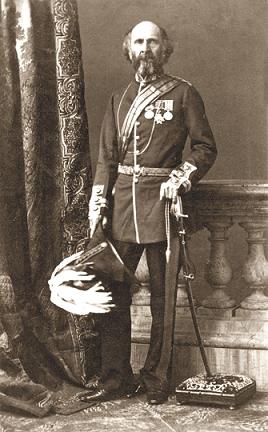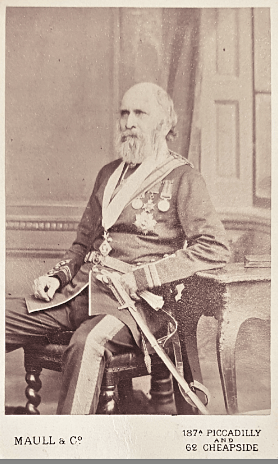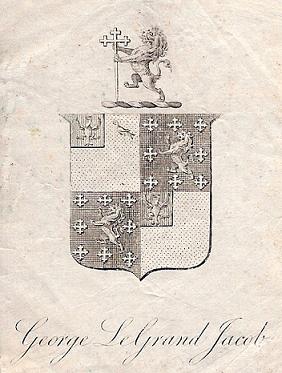George Le Grand Jacob facts for kids
Quick facts for kids
George Le Grand Jacob
|
|
|---|---|
 |
|
| Born | 24 April 1805 Roath Court, Wales |
| Died | 27 January 1881 (aged 75) London, England |
| Buried |
Brookwood Cemetery, Surrey
|
| Allegiance | |
| Service | Bombay Army |
| Years of service | 1820–1861 |
| Rank | Major-general |
| Wars | |
| Other work | Special Political Commissioner, Southern Mahratta Country |
Major-general Sir George Le Grand Jacob (1805–1881) was a British army officer. He served the East India Company, a powerful British trading company. He was also very good at learning many different languages from Asia.
Contents
Early Life and Education
George Le Grand Jacob was born on April 24, 1805. His birthplace was Roath Court, near Cardiff, Wales. He was the youngest of his parents' children.
In 1815, his family moved to Guernsey, an island. He went to Elizabeth College in Guernsey. He also had private teachers in France and England. When he was about 15, he went to London. There, he studied languages from Asia with Dr. John Borthwick Gilchrist.
Military Career
In 1820, George Jacob joined the British army in India as a cadet. On his way to Bombay, he became good friends with Alexander Burnes. On June 9, 1821, he became an ensign. This was a junior officer rank. He joined the 2nd Bombay Native Infantry regiment. He rose through the ranks in this regiment.
Promotions and Language Skills
His promotions included:
- Lieutenant: December 10, 1823
- Captain: June 6, 1836
- Major: May 1, 1848
- Lieutenant-colonel: November 15, 1853
- Colonel (honorary): December 6, 1856
- Brigadier-general: July 21, 1858
- Major-general (upon retirement): December 31, 1861
Jacob quickly became an interpreter in Hindustani. He was praised for this skill. Later, he also learned Persian and Marathi.
Early Service in India
He served with his regiment against the Bheels in the jungles of Nerbudda. He also served in Cutch and Ukulkote. In 1831, he took a break and went home. In 1833, he worked at the East India Military Seminary. While there, he tried to translate an old manuscript. He decided it was not worth printing.
In 1835, he married Emily. Sadly, she died at sea on their way to India. Jacob became very ill but recovered.
Political Agent and Explorer
In 1836, he became a political assistant in Kattywar. He handled important political matters there from 1839 to 1843. The government praised him for solving a dispute about who should rule Limree. He also wrote important reports on local tribes.
In 1845, Jacob was an aide to Major-general Delamotte. This was during unrest in the South Mahratta country. He was hurt while leading an attack on a fort. In April 1845, he became a political agent in Sawunt Warree. This state was in trouble. Jacob worked for six years to bring order, improve finances, and fix problems.
In 1851, Jacob became a political agent in Cutch. He also went to Sind as a special commissioner. He investigated a case involving Mir Ali Murad Talpur. He also looked into problems at Bombay. He later traveled to China, Java, Sarawak, and Australia. He was always learning and exploring. On his way back, his ship was wrecked. He was rescued by a Dutch ship.
Anglo-Persian War
In December 1856, Jacob left Cutch. He planned to retire. However, he joined Outram in the Anglo-Persian War. He commanded a group of soldiers in Persia. He returned to Bombay in May 1857.
Indian Mutiny
In August 1857, Jacob arrived in Kolapore. This was after the 27th Bombay native infantry had rebelled there. With only a few troops, he calmly disarmed the regiment. He brought the leaders of the rebellion to justice.
On December 4, the city closed its gates against Jacob's small force. Jacob quickly blew open a gate. He made the rebels run away. He tried and executed 36 rebels on the spot. He held the city until the danger passed. His strong actions stopped the rebellion from spreading.
Jacob was praised for his quick and brave actions in Kolapore. He showed what a British officer could do with courage and good judgment. His powers were expanded to cover the whole South Mahratta country. He was made a special commissioner and a brigadier-general. He successfully dealt with other local rebellions. He then went to Goa to talk with Portuguese officials. This was about rebels on the border. After finishing this, he resigned his command. He officially remained a political agent in Cutch until he left India in 1859.
He retired as a major-general in 1861. He received important honors for his service. He was made a Companion of the CB in 1859. He became a Knight Commander of the KCSI in 1869.
Later Life and Legacy
George Jacob was known for being fearless. He disliked unnecessary rules and unfairness. He was also very good at understanding and getting along with people from Asia. He often spoke up for the rights of native people. This sometimes caused problems with other officials.
Throughout his life, he studied Indian literature. He also worked to promote research into the history and old objects of India. He copied some of the earliest Asoka inscriptions (from 250 BC). Many inscriptions he copied are in a book called Corpus Inscriptionum. He also wrote many papers about Western India. These papers covered history, archaeology, and other topics.
In his younger days, he was a keen hunter. He once hunted seven lions in one day. His hunting skills were even remembered in local songs.
The last twenty years of Jacob's life were difficult. He suffered from asthma, bronchitis, and slowly lost his eyesight. But his mind remained sharp. With help from his niece, he wrote his book, Western India before and during the Mutiny. This book was published in 1871. It was highly praised by the historian John William Kaye.
Before he died, he paid for a translation of some interesting papers. These papers were about the island of Bali. They were later published in a journal. George Jacob died in London on January 27, 1881. He was buried in Brookwood Cemetery in Surrey.
Images for kids
 | George Robert Carruthers |
 | Patricia Bath |
 | Jan Ernst Matzeliger |
 | Alexander Miles |






